Allison Williams Get Out
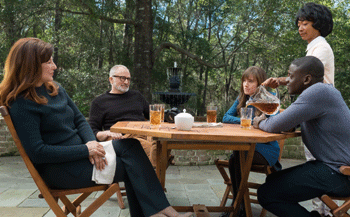
Allison Williams Get Out
Cast: Allison Williams, Daniel Kaluuya, Catherine Keener, Bradley Whitford
Director: Jordan Peele
Genre: Thriller, Horror
Rated: MA
Synopsis: In Universal Pictures' Get Out, a speculative thriller from Blumhouse (producers of The Visit and Insidious series, The Gift) and the mind of Jordan Peele, when a young African-American man visits his white girlfriend's family estate, he becomes ensnared in a more sinister real reason for the invitation.
Now that Chris Washington (Daniel Kaluuya, Sicario) and his girlfriend, Rose Armitage (Allison Williams, Girls), have reached the meet-the-parents milestone of dating, she invites him for a weekend getaway upstate with Missy (Catherine Keener, Captain Phillips) and Dean (Bradley Whitford, The Cabin in the Woods).
At first, Chris reads the family's overly accommodating behavior as nervous attempts to deal with their daughter's interracial relationship, but as the weekend progresses, a series of increasingly disturbing discoveries leads him to a truth that he could have never imagined.
Equal parts gripping thriller and provocative commentary, Get Out is written and directed by Peele (Key and Peele) and produced by Blumhouse's Jason Blum (Split), as well as QC Entertainment's Sean Mckittrick (Donnie Darko, Bad Words), QC's Edward H. Hamm Jr. (Bad Words) and Peele.
Get Out
Release Date: May 4th, 2017
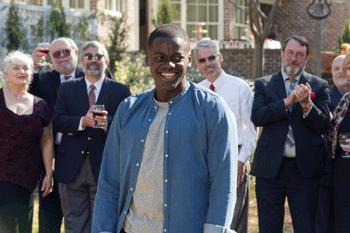 About The Production
About The Production
An American Monster: Get Out Takes Form
When most audiences hear the name Jordan Peele, they think of one-half of the brilliant duo of Key and Peele and the star of Keanu. An actor known as much for his comedic writing as he is for starring in film and television comedies, Jordan Peele is equally accomplished in voiceover work and impersonations. But what many do not realise is that the comic mastermind and Emmy Award winner has long been a fan of a genre of another sort. His directorial debut would occur with Universal Pictures, the studio that had invented the monster movie of another kind, and it would happen with Universal's partner in horror, Jason Blum's Blumhouse Productions.
Jordan Peele, who got his start as a writer and actor on MADtv, has long been a fan of horror movies and believes that terror and comedy draw from the same well of inspiration…and that both are grounded in our need to explore the absurdity of our humanity. He appreciates the fact that we deal with our troubles and fears through the visceral, cathartic experience that comes from laughing or allowing ourselves to become scared. In sum, if we can master the emotions, we can move through the experience.
The filmmaker offers that this tension and release can be viscerally satisfying for the audiences: 'In one, you're trying to get a laugh, and in the other, you're trying to get a scare. It was exciting for me to use everything I've learned in comedy for my favorite genre, which is -thriller.'"
No stranger to mining the absurd from reality, when he began the screenplay, Peele outlined a premise that was equal parts terrifying and social commentary. The result was Get Out, a provocative thriller that blended humor, satire and horror…and wasn't afraid to tackle the current state of race relations in America head on. 'This idea came from my wanting to contribute something to the genres of thriller and horror that was unique to my voice," he says. 'The fact that it goes to race goes to the area I've worked in a lot, which is comedy. This was a movie that reflects real fears of mine and issues that I've dealt with before."
Jordan Peele imagined a protagonist named Chris, an African-American photographer and artist in New York City who is taking his relationship with his Caucasian girlfriend to the next level by meeting her parents over a long weekend. As soon as Chris arrives at the family's rural, upstate home, he begins to suspect that everything is not as it seems. When he discovers that a number of black men have gone missing in that suburb, his suspicion reveals itself to be more than unfounded paranoia. What starts out as a mundane, obligatory weekend spirals and builds toward a crazy, horrific, thrilling, terrifying, and likewise fun, conclusion.
The filmmaker admits that he enjoys playing with the audience's expectations of what could happen and upending a foregone conclusion. 'A big piece of the premise to Get Out is that you have white girl bringing a black guy home, and she hasn't thought through all of the social ramifications of that," Jordan Peele gives. 'She assumes her family is going to be fine with it. They turn out to be, but there are some subtler works at play that we begin to see a part of something much more sinister."
This series of not-quite-right moments that make Chris more and more suspicious unfold slowly. Whether it is curiosity about the odd behavior of the Armitage's help"or feeling like he stepped into another world during the family's annual celebration of their departed grandfather"Chris realises that he isn't the one who is going insane. 'The trick was to make sure that nothing so crazy happened so fast that we wouldn't believe the characters would stay in this situation," Jordan Peele reveals. 'The element that starts to alarm Chris is meeting the help, and finding that they're a little off. 'They're not like anybody he's ever met."
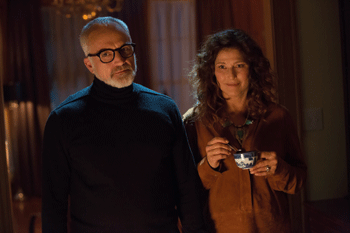 Still, the writer/director says that it was of the utmost importance for the hero of the thriller to never do anything the audience wouldn't. 'I hate that in a movie," laughs Peele. 'Especially in a thriller, when you want somebody to just pick up the phone, call the damn cops and get out of the house. That's what I allowed Chris to be"an actual, smart, logical human being"because it is so satisfying."
Still, the writer/director says that it was of the utmost importance for the hero of the thriller to never do anything the audience wouldn't. 'I hate that in a movie," laughs Peele. 'Especially in a thriller, when you want somebody to just pick up the phone, call the damn cops and get out of the house. That's what I allowed Chris to be"an actual, smart, logical human being"because it is so satisfying." As do the most provocative of horror offerings"from George Romero's Dawn of the Dead's exploration of the height-of-Vietnam era to Wes Craven's The Last House on the Left examination of the inherently violent nature of humans"Get Out greets audiences with a provocation that is much more than simple entertainment. 'This movie is about a lot of things," states Peele. 'It's about the way America deals with race and the idea that racism itself is a demon; it's an American monster. It's also about the notion of neglect and the idea that, if we allow ourselves to do so, humans can stand by while atrocities happen." He felt it was critical to mine the genre and discuss how race can have an impact on horror. 'It's an important piece of this conversation."
While many would have expected the multihyphenate to make his theatrical debut with a light-hearted physical comedy, Jordan Peele knew he wanted Get Out to be his fore into directing. 'Writing and directing are easier than not doing both," he says. 'The beauty is that they're done at separate times, so you don't have to overlap the responsibility. It's a great advantage to feel the confidence to change something on set, and know that you're not missing what the writer intended."
To help him bring his screenplay to the big screen, Peele and veteran producers Sean McKittrick and Edward H. Hamm Jr."who have guided many actors making their directorial debuts, including Jason Bateman on the ingenious Bad Words"turned to producing maestro Jason Blum, who has reinvented the genre since he shepherded Paranormal Activity to staggering heights. His latest project, Split, from writer/director/ producer M. Night Shyamalan, recently hit No. 1 for three weeks on the box-office charts, and the distribution deal Blum has with Universal offered Peele his entry point into theatrical distribution.
Blum reflects on his reason for wanting to join Peele on this journey: 'Jordan is a unique combination of someone who is incredibly talented and collaborative. I see every scary movie and read every scary script, and never saw anything like this. As for Jordan making the transition, I believe there are a lot of parallels between comedy and horror; they are the two types of genres in which people have physical reactions in the theater. The timing of a joke and a scare"as well as the way you construct both in a movie"are very similar. The combination of that and the way Jordan talked about Get Out gave me the confidence to roll the dice on this movie."
McKittrick first connected with the writer/director through a mutual friend: 'I get to thank Keegan-Michael Key, who introduced me to Jordan, mainly because Jordan is obsessed with horror films. He pitched me the idea for Get Out, and I had never heard anything like it. Whether they are The Stepford Wives or Rosemary's Baby, the greatest forms of horror unveil the social commentary that leaks beneath the surface of our society. I immediately said, -We absolutely have to make this movie.'"
The producer, who cut his teeth in the industry by producing the cult-classic Donnie Darko, was more than impressed with the burgeoning directorial talent he found in Peele. McKittrick commends: 'It's been one of the best experiences I've ever had. Jordan is an incredibly hard worker who knows exactly what he's doing. Comedy and horror are such close cousins that he was a master of this before he even came in. He studied horror his entire life."
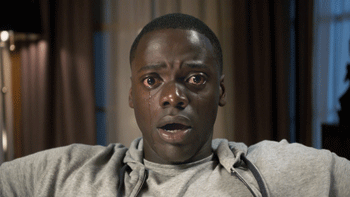 Blum is the first to admit he is drawn to films that are so much more than linear fare. 'Get Out gives you all the thrills and the scares of a great scary movie, but there's more to it," he reflects. 'It reminded me of what we did with The Purge, which is a scary, thriller, action franchise, but one that also says something about our society. Get Out works in a similar way in that it delivers everything you want from a great genre movie, but it also says a lot about the world. Jordan has figured out a terrific way to shine a light and talk about race…then take this to a level that's grotesque. The story is very disarming because you are convinced you're going to see certain events unfold in a way that you're used to; in fact, they unfold in exactly the opposite way."
Blum is the first to admit he is drawn to films that are so much more than linear fare. 'Get Out gives you all the thrills and the scares of a great scary movie, but there's more to it," he reflects. 'It reminded me of what we did with The Purge, which is a scary, thriller, action franchise, but one that also says something about our society. Get Out works in a similar way in that it delivers everything you want from a great genre movie, but it also says a lot about the world. Jordan has figured out a terrific way to shine a light and talk about race…then take this to a level that's grotesque. The story is very disarming because you are convinced you're going to see certain events unfold in a way that you're used to; in fact, they unfold in exactly the opposite way." You've Been Chosen: Casting the Thriller
To set up the culture clash at the heart of Get Out, Jordan Peele cast a wide net to find his players. From critically lauded performers to young upstarts who are just breaking into the business, he filled the thriller's roster with an unexpected array of talent. For Jordan Peele, all his experience as a performer would prove quite valuable as he directed his actors. 'Jordan's been in front of the camera for so many years that he understood what they were going through," says McKittrick. 'He was able to put all the actors at ease. He has complete control and understanding of what each character is because he created them. Each actor was able to bring a different perspective to their part, which Jordan fed on and added to."
Central to the thriller is Chris Washington, an aspiring photographer and an artist with whom Rose has fallen in love. Peele explains that his protagonist has a complicated past: 'Chris is a highly intelligent guy who has had emotional trauma, and someone who expresses his pain through art."
For Jordan Peele, it was important to cast a performer who could emote the confusion Chris has"especially toward his preconceived notions of how he will be received by a white family. 'The element that makes Chris the most nervous is the fact that Rose gave them no warning that he's black. He's anticipating an awkward situation. I would say that Chris is -woke.' He's in love, but he's approaching this situation with an open mind."
Chris needed to be portrayed by a performer who could walk the line between agreeable newcomer to the Armitage family and credible outsider. The production team found their hero in British performer Daniel Kaluuya. 'Daniel Kaluuya is a total star," lauds Peele. 'He has a relatability that is infectious, and he has an ability to be in the moment that is totally masterful, and I love him from Black Mirror and Sicario. He carries the film."
While Chris tries to put his suspicions behind him and enjoy the weekend, he begins to feel that he should trust his instincts about the Armitage family, especially Rose's mother, Missy, a psychiatrist who insists that her daughter's new boyfriend should try her unique brand of therapy. Although Chris wants to quit smoking, he is no rush; still, that doesn't stop the good doctor from pushing the issue. 'Chris sees that Missy is intense," explains Daniel Kaluuya, 'and that she is an in-your-face kind of woman that gets what she wants without trying. He finds himself late at night in her room hypnotized."
The reason Rose chose this weekend to bring her new boyfriend up is to celebrate the annual tradition of her late grandfather and grandmother's garden party. The gathering of friends and extended family to honor the patriarch is initially heartwarming for Chris, as he lost his own mother at a young age and has had to fend for himself for the majority of his life. Kaluuya sets up the scene: 'So much of this film is about the anticipation of what is going to happen. Chris notices that something is off at this party, and he senses an intense amount of undercover racism. He has an interaction which immediately proves the environment isn't for him, and he's ready to leave. He knows he does not fit in, and is not feeling good about it."
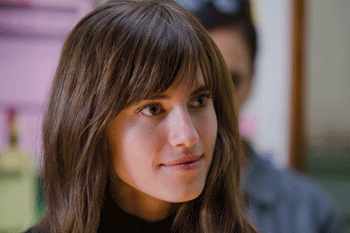 In the character of Rose, Jordan Peele wrote the perfect girlfriend for the story's hero; indeed, she is just as mortified by her family's behavior toward Chris as he is embarrassed about it. 'It was very important for this film that, at its core, it's a love story," he says. 'This is a couple that we're rooting for. She's not perfect, because there are elements to being in an interracial relationship that she wakes up to as the movie goes on, but she is trying to understand what Chris is going through. She's a very supportive, understanding and funny-smart character."
In the character of Rose, Jordan Peele wrote the perfect girlfriend for the story's hero; indeed, she is just as mortified by her family's behavior toward Chris as he is embarrassed about it. 'It was very important for this film that, at its core, it's a love story," he says. 'This is a couple that we're rooting for. She's not perfect, because there are elements to being in an interracial relationship that she wakes up to as the movie goes on, but she is trying to understand what Chris is going through. She's a very supportive, understanding and funny-smart character." To portray the young nurse Rose, the production brought aboard Allison Williams, a performer whose stand-out work in HBO's Girls and work in musical theater brought her to the team's attention. For Blum, this offered the chance to work with a dear friend. 'I have been friends with Allison Williams for a long time," he states, 'so it was a really cool opportunity to finally get to work with her. She did an amazing job."
'Allison Williams gives us the comfort and the love that is at the core of this movie," agrees Jordan Peele. 'She gives us something to root for in their relationship.
'Rose is the girl next-door, very progressive, liberal and loving," adds Daniel McKittrick. 'She has her own reservations about what her parents are going to think of her black boyfriend, but you never get the sense that she's siding with what might be wrong with the family. You believe she's always on Chris' side and is truly in love with him."
The actresses appreciated portraying a young woman whose true intentions are just beneath the surface. She introduces us to her character: 'Rose takes her black boyfriend home to meet her white family, and something is not quite right once they arrive. Rose is torn between her allegiance to her family and her new boyfriend, but she is committed to Chris. She is willing to shake things up with her family in order to salvage their relationship."
Allison Williams appreciated Peele's interest in pushing the story outside of horror tropes, and sums the cast's feelings about working with him on set: 'It is a bonus to have the writer also be your director"that there is a continuity of vision, thought and intention."
The young performers are in the majority of scenes of Get Out, and their chemistry and skills was not lost on the filmmakers. Shares McKittrick of the pair: 'Allison Williams was the first one to board the film, although Daniel had been chasing the film for quite a while. They are the two anchors of the film. Allison is an incredible actress; both on- and off-screen, she's a wonderful person. Daniel is an exceptional actor who acts with his entire body. I've never seen anything like it. He put so much into it that he's actually exhausted between takes. His intensity anchored the film entirely because the audience has to relate to Chris as someone who is an everyman."
When it came to casting the parts of Rose's parents, the retired surgeon Dean and psychiatrist Missy, the team selected two performers who have navigated the worlds of comedy their entire careers. In two-time Oscar® nominee Catherine Keener, as riveting in Being John Malkovich and Captain Phillips as she is The 40-Year-Old Virgin, and three-time Golden Globe Award nominee Bradley Whitford, who was just as fascinating in The West Wing and Transparent as he was The Cabin in the Woods, the producers found actors to play anything but stereotypical villains.
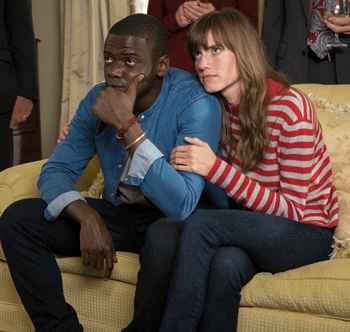 What Blum appreciated about the heads of the Armitage family is that they embody the liberal elite that Peele skewers in his screenplay. While Rose hasn't told them that Chris is black, she is certain they will be fine with his being of another race. What Chris finds, however, is far from that. 'The parents start to say things that are on the edge of racist. They just make everyone feel uncomfortable," says Blum. 'They ask Chris if he likes golf…then tell him they're big fans of Tiger Woods. They are painted as part of the white, liberal elite"very sensitive about race. In fact they're quite the opposite."
What Blum appreciated about the heads of the Armitage family is that they embody the liberal elite that Peele skewers in his screenplay. While Rose hasn't told them that Chris is black, she is certain they will be fine with his being of another race. What Chris finds, however, is far from that. 'The parents start to say things that are on the edge of racist. They just make everyone feel uncomfortable," says Blum. 'They ask Chris if he likes golf…then tell him they're big fans of Tiger Woods. They are painted as part of the white, liberal elite"very sensitive about race. In fact they're quite the opposite." As was Allison Williams, Bradley Whitford was thrilled to be a part of the production. 'I am such a fan of Jordan's that I would have done yard work for him," the actor laughs. On the shock factor of the film, Bradley Whitford says: 'I think people will have an odd reaction to this. It flips your idea of genre upside down."
Jordan Peele shares a bit about their characters and the actors' work: 'Bradley plays Dean Armitage, the disarmingly kind, and kind of goofy, father. With him, it turns out there's more than meets the eye. Catherine does this beautiful performance as Missy, who hypnotizes Chris and gives him an experience completely out of his comfort zone. She is the perfect mother-in-law on paper, and then as the movie goes on, you realize, -Oh. There's something darker going on here.'"
The final member of Rose's immediate family is her younger brother, Jeremy, who is as interested in provoking Chris as he is in getting to know him. Portrayed by Caleb Landry Jones, who first came to audience's attention with television's Friday Night Lights, and then rocketed to fame as the memorable Banshee in X-Men: First Class, Jones brings to the role of Jeremy an inexplicable creepiness that sets Chris off from the moment he encounters him. Raves Peele; 'Caleb can channel so much menace, and yet he's so fun and infinitely engaging to watch. He's a great tonal centerpiece for the movie, in that way."
Portraying the parts of the Armitage's live-in help are The Purge: Election Year and Amazon's Good Girls Revolt's Betty Gabriel as Georgina, the family's housekeeper, and Django Unchained and Pete's Dragon's Marcus Henderson as Walter, the groundskeeper. When Chris first encounters the pair, he finds them symptomatic of just how strange the rural community is toward African-Americans. Whether it is Walter's dead-eyed run about the grounds in the middle of the night or Georgina's staring blankly into a mirror, neither of them seem like they are all there.
With every black person Chris encounters during his trip upstate, he gets the opposite of what he expects. The situation in which Chris has found himself is just as uncomfortable for him as it is for the audience. Peele crafted his story to make sure that was the case: 'They are sort of traditional African-American servants at this place, and Chris is being brought in as a family member. With Georgina and Walter, Chris doesn't get the African-American camaraderie he's looking for in them, and that proves to be very isolating and alienating."
While the set-up is par for the course for the Armitage family, it feels very uncomfortable for their weekend guest. 'It's so weird for Chris," explains Kaluuya. 'Rose's family is white, and the servants who are helping are black. That's just a bit odd for him, especially coming from the city in New York, which is one of the most modern cultural cities in the world."
The charming Chris often encounters Georgina glaring at him…or herself. 'Georgina has a love of herself," states Gabriel. 'She likes the way she looks, so she looks at herself as often as she can."
The character begins to show her true colors at the Armitage annual get-together. 'The party is a family tradition to honor Rose's grandparents and keep their memory alive," explains Gabriel. 'It is shocking for Chris, and everyone is genuinely interested in him being there… Maybe a little too interested."
Chris gets the feeling that the groundskeeper is just as protective of the Armitage secret as Georgina is. 'Walter is the Armitage's groundskeeper, and he is very attached to the family," adds Henderson. 'Something is a little off about him, the way he sees things comes from a different place." The performer appreciated that the story is cloaked in shadow…until it all explodes. 'My character is hiding a huge secret.
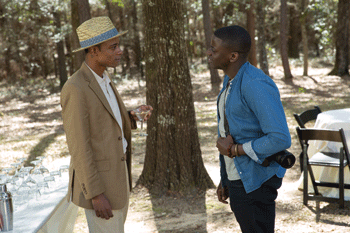 Jordan gave me a note on set that said, -You have this secret you really want to tell, but you cannot,' which lit my five-year-old self up. That made this production fun."
Jordan gave me a note on set that said, -You have this secret you really want to tell, but you cannot,' which lit my five-year-old self up. That made this production fun." Georgina and Walter are not the only African-Americans that Chris encounters when he makes his way to the primarily-Caucasian enclave over the weekend. Lakeith Stanfield, who stole his scenes as Snoop Dogg in 2015's smash Straight Outta Compton was brought aboard the team to play Logan King, a young man just as remarkable in his old-fashioned dress as he is speech and mannerisms. The only other guest who is also black, Logan seems quite out of place with his elderly white wife. 'Logan knows Rose's family intimately," explains the performer. 'He has known them for years, and is glad to celebrate with them at the party."
Much like his counterparts, Logan isn't remotely who or what he seems, especially with a flash from Chris' cell phone gives him an apparent seizure…one that makes him grab Chris and scream at him to get out of the house. 'He undergoes a scary transition during the film," says Stanfield. 'During this transition, he turns into someone who is a separate cultural expression of the guy everyone thinks they know."
Daniel McKittrick explains the instantaneous transformation: 'The flash on Chris's phone as he takes a photo of Logan triggers something inside of Logan where he attacks Chris. He has blood coming out of his nose, and we know it's something that's serious. It takes Missy, who is a psychiatrist, to bring Logan back to what they want him to be."
Jordan Peele could not have been prouder of the work of his core young supporting cast. Of their talents, he lauds: 'Betty just did this-ass performance as Georgina, as did Marcus as Walter, the groundskeeper. Lakeith plays such a unique character; he shows this range that is totally impressive, and he committed himself fully for the role."
One of the final principal curious guests of the annual garden-party celebration is Jim Hudson, played by the inimitable character actor Stephen Root, known for his brilliant voiceover work, as well as comedy in films from Dodgeball to Office Space and serious fare in Boardwalk Empire and Trumbo. 'My character is blind and might be a person that you would not want to cross, or he might be a swell man from the city," explains Root.
It remains just as important to the cast as it does for Jordan Peele and the other producers that the secrets of Get Out remain intact for the audience. Root typifies that mandate when he coyly states: 'Chris is a handsome young man, and everyone wants to meet him"just not necessarily for the same reasons. Nothing is quite what it seems, including the party and the guests. The audience does not find out what is actually going on for a while."
The film's knight in shining armor is in the form of an annoyed TSA agent who also happens to be Chris' best friend back home: Rod Williams. Played by Milton 'Lil Rel" Howery, a stand-up who has taking his whip-smart timing to TV series such as The Carmichael Show, Rod is the voice of the audience. 'Rod is the character giving us that voice at a horror movie where everybody should be screaming, -Get out! Get out of the house. Don't turn around. Don't back up into the closet. He has several phone calls with Chris throughout Chris' time at Rose's family's house. At the same time, Rod is figuring out some of what's going on, and he's also getting a lot of it wrong. He's our comic relief and our voice of reason at the same time."
Something's Weird: Design of the Thriller
The production of Get Out took place in Mobile, Alabama, and Peele set up a core team led by production designer Rusty Smith, cinematographer Toby Oliver, editor Gregory Plotkin, costume designer Nadine Haders, music supervisor Christopher Mollere and composer Michael Abels. The film had its share of good-weather shooting between rain spells"and trying to keep the extras dry"and the general feeling of creating a project that was more than the sum of their parts permeated the production.
While the team had many challenges that lie ahead"notably shooting in the dark corners of the Armitage house in the middle of the night"perhaps the most complex was the garden party sequences in which Logan attacks Chris. Whitford sets up the scene: 'This auction is the most important charity. There are a lot of charities that deal with sickness, difficulties in the world, but what we're supporting here is something that transcends illness."
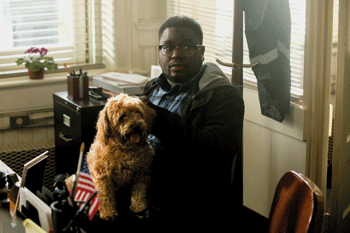 Haders outfitted the party guests in finery befitting a bespoke group of upper-crust members of the upstate New York elite. Smith crafted a setting designed to make every single guest feel at ease…save the one member of the party who is certain he doesn't belong with his odd hosts. Each shot from Oliver was intended to amplify that feeling for Chris. Even though everyone is genteel and patronizingly sweet to him, the menace lurks just outside every frame"as close-up shots of staring partygoers leer when they think Chris isn't looking.
Haders outfitted the party guests in finery befitting a bespoke group of upper-crust members of the upstate New York elite. Smith crafted a setting designed to make every single guest feel at ease…save the one member of the party who is certain he doesn't belong with his odd hosts. Each shot from Oliver was intended to amplify that feeling for Chris. Even though everyone is genteel and patronizingly sweet to him, the menace lurks just outside every frame"as close-up shots of staring partygoers leer when they think Chris isn't looking. 'It is a scene that is a great representation of what the movie is," shares Jordan Peele. 'It's both a scary sequence, but also kind of funny. Chris' feeling of isolation at being the only black guy at the party is all over his face. Everybody who speaks with Rose and Chris is bringing up their connection to the African-American culture."
This moment struck a chord with many of the players. 'This happens in real life a lot," states Jordan Peele. 'Chris is denied an experience where he's anything but the token black guy. That scene is a symbol for the deeper horrors going on. At one point, Chris sees Logan at the party. There's a sigh of relief to see another African-American guy, but when Chris goes up to say what's up, it becomes clear that Logan is not having the same experience as Chris is. He is in this weird Stepford-zone, where he feels more aligned with the party than with Chris."
Production wrapped, the team reflects upon their hopes for Get Out. 'First and foremost I want audiences to feel like they had a fun ride," says Daniel McKittrick. 'Then I want them talking about the social commentary in the film, which is our own natural prejudices that are built from birth, from wherever we were raised and whomever raised us."
For Blum, Get Out proved to be a successful exercise in genre-blending, which makes for his favorite type of film. 'While this is a scary movie and not a horror-comedy, it's important for horror movies to have comedy in them," he ends. 'It makes the horror work much better when you give the audience a chance to laugh. That disarms them, and then when you scare them, they're much more scared after all."
For the man who created the universe we've just discussed, his hopes for moviegoers is that they enjoy his film on the multiple levels it is intended. Concludes Jordan Peele: 'First and foremost, I always want to entertain, so I hope people experience that in the theater. Get Out is a loud experience. It's fun, scary and titillating, and I want audiences to laugh. After that, I hope that they have a discussion about race and horror films that they haven't had before."
Get Out
Release Date: May 4th, 2017
MORE
- Mission: Impossible Fallout
- Glenn Close The Wife
- Allison Chhorn Stanley's Mouth Interview
- Benicio Del Toro Sicario: Day of the Soldado
- Dame Judi Dench Tea With The Dames
- Sandra Bullock Ocean's 8
- Chris Pratt Jurassic World: Fallen Kingdom
- Claudia Sangiorgi Dalimore and Michelle Grace...
- Rachel McAdams Disobedience Interview
- Sebastián Lelio and Alessandro Nivola...
- Perri Cummings Trench Interview



